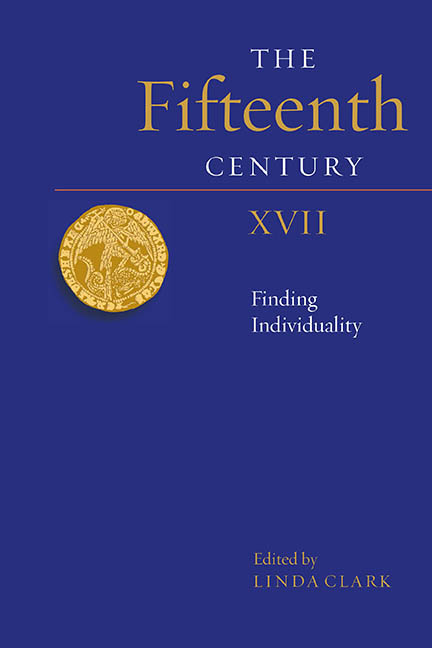Book contents
- Frontmatter
- Contents
- Contributors
- Preface
- Abbreviations
- Royal Wills, 1376–1475
- Propaganda, Piety and Politics in the Fifteenth Century: Henry V’s Vernacular War Letters to the City of London, 1417–21
- ‘To Be of Oon Demeanyng and Unite for the Wele of Your Self and of the Contre There’: Yorkist Plans for the Lordship of Ireland, the Last Phase
- A Mirror for a Princess: Antoine de la Sale and the Political Psyche of Margaret of Anjou
- Margaret of Anjou and the Language of Praise and Censure
- On ‘Peyne of their Lyfes … they Shuld no Verdit gif, but if they Wold Endite the Seid William Tresham of his Owen Deth’: the Murder of Lawyers in Fifteenth-Century England
- ‘Stond Horeson and Yelde thy Knyff’: Urban Politics, Language and Litigation in Late Medieval Canterbury
- ‘In to the Sterre Chambre’: Female Plaintiffs Before the King’s Council in the Reign of Henry VII
- Index
- Contents of Previous Volumes
A Mirror for a Princess: Antoine de la Sale and the Political Psyche of Margaret of Anjou
Published online by Cambridge University Press: 19 August 2020
- Frontmatter
- Contents
- Contributors
- Preface
- Abbreviations
- Royal Wills, 1376–1475
- Propaganda, Piety and Politics in the Fifteenth Century: Henry V’s Vernacular War Letters to the City of London, 1417–21
- ‘To Be of Oon Demeanyng and Unite for the Wele of Your Self and of the Contre There’: Yorkist Plans for the Lordship of Ireland, the Last Phase
- A Mirror for a Princess: Antoine de la Sale and the Political Psyche of Margaret of Anjou
- Margaret of Anjou and the Language of Praise and Censure
- On ‘Peyne of their Lyfes … they Shuld no Verdit gif, but if they Wold Endite the Seid William Tresham of his Owen Deth’: the Murder of Lawyers in Fifteenth-Century England
- ‘Stond Horeson and Yelde thy Knyff’: Urban Politics, Language and Litigation in Late Medieval Canterbury
- ‘In to the Sterre Chambre’: Female Plaintiffs Before the King’s Council in the Reign of Henry VII
- Index
- Contents of Previous Volumes
Summary
‘Women’, wrote Schopenhauer, ‘ought to mind home – and be well fed and clothed – but not mixed in society. Well educated, too, in religion – but to read neither poetry nor politics – nothing but books of piety and cookery.’ His philosophy, scarred as it is by evident misogyny, provides a good conversation point from which to embark upon a consideration of medieval queenship. For it is tempting nowadays to minimise the strategic failings of these great political women and to emphasise instead the prejudice that has clouded their reputations. Popular and aristocratic prejudice confronted them in their lifetimes. Posthumously, prejudiced authors defined their legacies.
It was during the 1980s, as a result of teaching a sixth-form course on the Wars of the Roses, that my interest was first drawn to Queen Margaret of Anjou. Our general class discussions sometimes ranged as far as Schopenhauer and it must be said that his views on women seemed less exceptionable then than they do now. My students had little published work on which to base their assessment of Queen Margaret. Beyond the generally oblique and unflattering references in the two great, recent studies of Henry VI by Bertram Wolffe and Ralph Griffiths, there was an older, conventionally narrative biography of Margaret herself by J.J. Bagley, who, in the 1940s when he wrote the book, was a schoolmaster like myself. And that was about it. In response, I wrote a paper which set out to bring the political role of the queen herself more clearly into focus. That piece eventually appeared in a book of essays on various aspects of the fall of the house of Lancaster. Somewhere in an old A-Level examination paper, I found an essay question that I never dared to set for my students. We discussed it, but I could not begin to tell them how to give an effective answer. ‘“The arts of peace were scarcely touched by war”. Discuss’. My own book had little to say that was relevant. Even the peaceful art of alchemy was presented in a sharply political context as part of the prelude to war.
- Type
- Chapter
- Information
- The Fifteenth Century XVIIFinding Individuality, pp. 61 - 80Publisher: Boydell & BrewerPrint publication year: 2020

